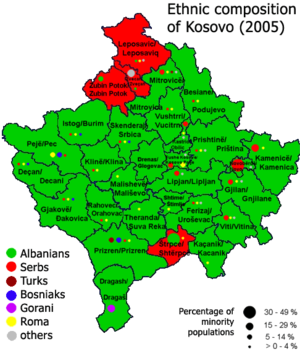 |
| (Photo credit: Wikipedia) |
"Kosovo truly is a problem for Serbia because it was illegally taken away from them, and Belgrade does not accept its unilateral declaration of independence," Kanin said for Monday's edition of Belgrade-based daily Politika.What both sides seem to be doing right now is trying to solve certain issues while freezing the main one, he added.
"Kosovo insists on its independence and sovereignty, end of story, and is not willing to compromise on that," said Kanin, who was also a senior intelligence analyst for the Central Intelligence Agency (CIA) until recently. On the other hand, Serbia is not ready to accept this "at the moment", he asserted, and added that this means that "there is no solution acceptable to both sides".
"This freezing of the basic question is not a bad approach as long as both sides, and others, understand that the main issue cannot be resolved, but only kept under control," he said, and added:
"The universal rule in politics is to tell the difference between problems that can be solved and those that can only be kept under control and to decide which are which. The problem is further complicated by the inconsistent attitude on the part of the EU because it is not clear whether setting up a border with Kosovo is a condition for Serbia's admission to the Union or not."Professor Kanin further stated that two communities in the Balkans, namely the Albanians and Bosniaks (Muslims), are more than others under the patronage of the United States - "for historical and political reasons".
Some Europeans say that it is, others say it is not, Kanin said. I think it would be much more effective if the EU simply said that neither Serbia nor Kosovo could become a member as long as they had not permanently resolved the Kosovo status issue," he was quoted as saying.
"When it comes to the Albanians, this applies equally to those in Kosovo and to those in Macedonia and Albania, as all of them rely heavily on the US," said Kanin.
The Albanian question is there because it is still not known how the Albanians will organize, as a single state or as more than one, what their relations with their neighbors will be like, and how the neighbors will adapt to the Albanian demographic expansion," concluded Kanin.





